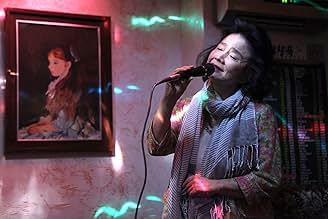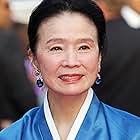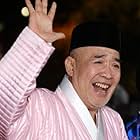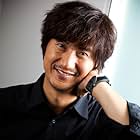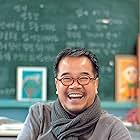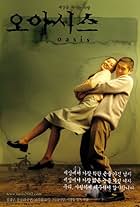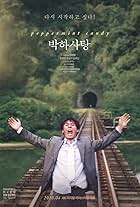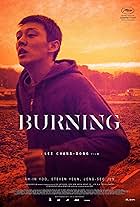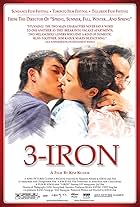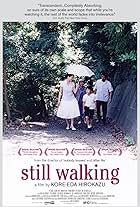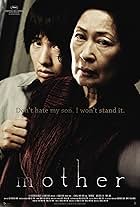A sixty-something woman, faced with the discovery of a heinous family crime and in the early stages of Alzheimer's disease, finds strength and purpose when she enrolls in a poetry class.A sixty-something woman, faced with the discovery of a heinous family crime and in the early stages of Alzheimer's disease, finds strength and purpose when she enrolls in a poetry class.A sixty-something woman, faced with the discovery of a heinous family crime and in the early stages of Alzheimer's disease, finds strength and purpose when she enrolls in a poetry class.
- Awards
- 27 wins & 25 nominations
- Director
- Writer
- All cast & crew
- Production, box office & more at IMDbPro
Storyline
Did you know
- TriviaThe idea for the film had its origin in a real-life case where a small town schoolgirl had been raped by a gang of teenage boys. When director Lee Chang-dong heard about the incident, it made an impact on him, although he hadn't been interested in basing a film on the actual events. Later, during a visit in Japan, Lee saw a television program in his hotel room. The program was edited entirely from relaxing shots of nature, "a peaceful river, birds flying, fishermen on the sea with soft new-age music in the background," and a vision for a possible feature film started to form. "Suddenly, it reminded me of that horrible incident, and the word 'poetry' and the image of a 60-year old woman came up in my mind."
- ConnectionsFeatured in At the Movies: Cannes Film Festival 2010 (2010)
Featured review
Poetry (2010)
Steady and stealthy, this film proposes to be as lyrical and compact as a poem, but then it keeps going and ends up larger and more impressive than you'd expect. And the acting by leading female actress, the Korean star Jeong-hie Yun, is startling and nuanced, a great performance.
At the heart of the plot are two plots. The first is the title line—elderly Mija has decided to learn how to write poetry, so she attends a class (filled with younger students). The second is about a sex crime—a gang rape it turns out—by her grandson, who she is raising alone. The two are nearly opposites in so many ways we see how life itself balances the beautiful and ugly, and responsibility and indifference. In a larger way, "Poetry" is about contemporary life in Korea, and the interactions of ordinary people in extreme situations will be revealing to many outside of Korea.
It's hard to overstate how well this movie pulls off something socially serious and yet makes it all understated and almost matter of fact. There are these several lines of thought that keep going throughout, and that don't quite converge until the very end, which is both tragic (truly) and a bit mysterious. What exactly is the implication of that last scene on the bridge, and the water that shows nothing? It hearkens to the beginning, of course, but we have our main character at hand.
In that sense, it's a brilliant, almost perfect evocation of contemporary Korea on the most normal, middle class level. Lovely and loving, and cold and brutal. And it shows the glib sexism of the men there, much like everywhere at various times. And how to survive you sometimes have to just proceed. And then, of course, sometimes you do not survive.
Steady and stealthy, this film proposes to be as lyrical and compact as a poem, but then it keeps going and ends up larger and more impressive than you'd expect. And the acting by leading female actress, the Korean star Jeong-hie Yun, is startling and nuanced, a great performance.
At the heart of the plot are two plots. The first is the title line—elderly Mija has decided to learn how to write poetry, so she attends a class (filled with younger students). The second is about a sex crime—a gang rape it turns out—by her grandson, who she is raising alone. The two are nearly opposites in so many ways we see how life itself balances the beautiful and ugly, and responsibility and indifference. In a larger way, "Poetry" is about contemporary life in Korea, and the interactions of ordinary people in extreme situations will be revealing to many outside of Korea.
It's hard to overstate how well this movie pulls off something socially serious and yet makes it all understated and almost matter of fact. There are these several lines of thought that keep going throughout, and that don't quite converge until the very end, which is both tragic (truly) and a bit mysterious. What exactly is the implication of that last scene on the bridge, and the water that shows nothing? It hearkens to the beginning, of course, but we have our main character at hand.
In that sense, it's a brilliant, almost perfect evocation of contemporary Korea on the most normal, middle class level. Lovely and loving, and cold and brutal. And it shows the glib sexism of the men there, much like everywhere at various times. And how to survive you sometimes have to just proceed. And then, of course, sometimes you do not survive.
- secondtake
- Sep 14, 2014
- Permalink
- How long is Poetry?Powered by Alexa
Details
- Release date
- Countries of origin
- Official sites
- Language
- Also known as
- Thi Ca
- Filming locations
- Production companies
- See more company credits at IMDbPro
Box office
- Budget
- ₩1,300,000,000 (estimated)
- Gross US & Canada
- $356,149
- Opening weekend US & Canada
- $18,900
- Feb 13, 2011
- Gross worldwide
- $2,539,040
- Runtime2 hours 19 minutes
- Color
- Sound mix
- Aspect ratio
- 1.85 : 1
Contribute to this page
Suggest an edit or add missing content



